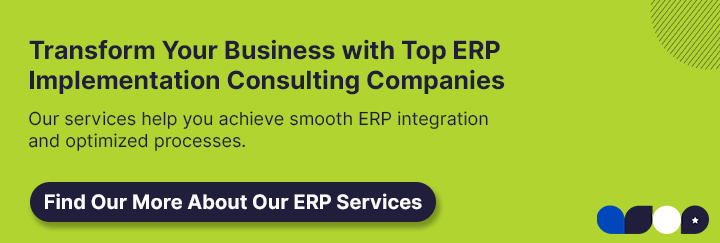AI in ERP: Key Benefits and Implementation Types
Updated on February 24, 2026
Artificial Intelligence (AI) is revolutionizing Enterprise Resource Planning (ERP) systems, transforming how businesses manage operations, data, and decision-making. By integrating AI, ERP platforms evolve from static tools into dynamic, intelligent systems that drive efficiency, agility, and innovation. This blog explores the key benefits of AI trends in ERP and the various implementation types available to businesses, offering insights into how organizations can leverage these technologies for a competitive edge. Whether you’re a small business or a global enterprise, understanding AI’s role in ERP can unlock new opportunities for growth and optimization.
>> Related Post: ERP Pricing 2025: Cost of ERP Software Implementation
The Role of AI in ERP Systems
AI enhances ERP systems by embedding advanced capabilities like machine learning, natural language processing, and predictive analytics into core processes. Traditional ERP systems rely on manual inputs and predefined workflows, often struggling with real-time adaptability. AI changes this by enabling systems to learn from data, automate complex tasks, and provide actionable insights. For example, AI can optimize supply chain logistics by predicting demand fluctuations or streamline financial operations through automated forecasting. As businesses face increasing complexity, AI-driven ERP systems offer a pathway to smarter, more responsive operations, making them indispensable for modern enterprises.
>> Related Post: Best ERP Trends in 2025
Key Benefits of Artificial Intelligence in ERP in 2025:
AI’s integration delivers transformative ERP benefits that address operational challenges and drive business success. Below are the primary advantages of AI in Enterprise Resource Planning:
1. Enhanced Decision-Making
AI empowers ERP systems with real-time analytics and predictive insights, enabling faster and more accurate decisions. By analyzing vast datasets, AI identifies patterns and trends that humans might miss. AI can forecast sales trends based on historical data and market conditions, helping businesses adjust strategies proactively. This reduces reliance on intuition and enhances strategic planning across finance, operations, and customer relations.
2. Increased Operational Efficiency
AI automates repetitive and complex ERP tasks, such as invoice processing, inventory management, and procurement. Autonomous AI agents can handle end-to-end workflows, reducing manual intervention and errors. For example, AI-driven ERP can automatically reorder stock when inventory levels drop, streamlining supply chain operations and cutting costs, according to industry studies.
3. Personalized User Experiences
AI tailors ERP interfaces to individual user needs, creating hyper-personalized dashboards that display relevant data. A sales manager might see real-time customer metrics, while a CFO views financial KPIs. This improves usability, reduces training time, and boosts productivity, especially for non-technical teams. Conversational AI, like chatbots, further simplifies interactions by allowing users to query data or initiate tasks via natural language.
4. Improved Scalability and Flexibility
AI-driven ERP systems adapt to changing business needs, making them highly scalable. Machine learning algorithms enable dynamic resource allocation, ensuring systems grow with the organization without requiring major overhauls. For small businesses, this means cost-effective scaling; for enterprises, it supports seamless integration of new modules or markets.
5. Enhanced Security and Compliance
AI strengthens ERP security by detecting anomalies and potential threats in real-time. For example, AI can flag unusual financial transactions, preventing fraud before it escalates. Additionally, AI ensures compliance with regulations like GDPR, HIPAA, and SOX by automating audits and monitoring data usage, reducing the risk of penalties in regulated industries like finance and healthcare.
>> Related Post: Best CRM Trends in 2025
Types of AI Implementation in ERP
Implementing AI in ERP systems can be approached in various ways, depending on business needs, resources, and existing infrastructure. Below are the primary implementation types, each with its strengths and use cases:
1. Embedded AI Modules
ERP vendors like SAP, Salesforce, and ServiceNow embed AI capabilities directly into their platforms. These pre-built modules include features like predictive analytics, chatbots, or automated workflows.
- Use Case: Ideal for businesses seeking quick deployment with minimal customization. For example, Salesforce’s Einstein AI integrates seamlessly with its CRM to provide predictive lead scoring.
- Advantages: Fast implementation, vendor-supported updates, and lower initial costs.
- Challenges: Limited flexibility for unique business needs; dependency on vendor roadmaps.
2. Custom AI Integrations
Businesses develop tailored AI solutions integrated with ERP systems via APIs or custom code. This approach uses tools like TensorFlow or Azure AI to build bespoke algorithms for specific processes.
- Use Case: Suited for enterprises with complex requirements, such as a manufacturer needing AI for predictive maintenance across IoT-enabled equipment.
- Advantages: Highly customizable, aligns with unique workflows, and supports innovation.
- Challenges: Requires significant development time, expertise, and investment.
3. Low-Code/No-Code AI Platforms
Low-code/no-code platforms allow businesses to add AI to ERP systems without extensive coding. Tools like Salesforce Flow or ServiceNow’s App Engine enable users to create AI-driven workflows or dashboards.
- Use Case: Perfect for small to mid-sized businesses with limited IT resources. For instance, a small retailer can build an AI chatbot to handle customer inquiries within its ERP.
- Advantages: User-friendly, rapid deployment, and cost-effective for non-technical teams.
- Challenges: Limited to platform capabilities; may not support highly complex AI models.
4. Hybrid AI Implementations
Combines embedded AI modules with custom integrations for a balanced approach. Businesses leverage vendor-provided AI features while adding tailored solutions for specific needs.
- Use Case: Suitable for organizations needing both speed and customization, such as a financial institution using embedded AI for compliance but custom AI for fraud detection.
- Advantages: Balances cost, speed, and flexibility; leverages vendor support and bespoke innovation.
- Challenges: Requires careful integration to avoid system conflicts.
5. Edge AI for ERP
AI processes data locally on IoT devices or edge servers, enhancing ERP performance in real-time applications. This is particularly relevant for industries with distributed operations.
- Use Case: Ideal for manufacturing or logistics, where real-time data from IoT sensors (e.g., machinery or vehicles) feeds into ERP systems for instant insights.
- Advantages: Reduces latency, supports remote operations, and enhances data privacy.
- Challenges: Requires robust IoT infrastructure and edge computing capabilities.
>> Related Post: Agentforce vs. Einstein AI: Strengths, Weaknesses, and Use Cases
Industry Applications of AI-Driven ERP
AI-driven ERP systems are reshaping industries by addressing unique operational challenges:
- Retail: AI optimizes inventory management and personalizes customer experiences through predictive analytics, boosting sales through targeted promotions.
- Manufacturing: Predictive maintenance and real-time production monitoring reduce downtime and improve efficiency, with AI analyzing IoT data for actionable insights.
- Healthcare: AI streamlines patient data management, automates resource allocation, and ensures compliance with healthcare regulations like HIPAA.
- Finance: AI enhances fraud detection, automates regulatory reporting, and improves risk assessment, ensuring secure and compliant operations.
>> Related Post: Top 10 Emerging Trends of AI in ERP for 2025/2026
ERP Professional Services Offered by Cloud Consulting Inc.
At Cloud Consulting Inc., we are dedicated to turning your business aspirations into reality through our comprehensive ERP services:
- ERP Professional Services
- ERP Consulting Services
- ERP Implementation Services
- ERP Software Development Services
- ERP Integration Services
Conclusion
AI is transforming ERP systems by delivering enhanced decision-making, operational efficiency, personalized experiences, scalability, and robust security. The five implementation types, embedded modules, custom integrations, low-code/no-code platforms, hybrid approaches, and edge AI offer businesses flexibility to adopt AI based on their needs and resources. From retail to healthcare, the advantages of AI-driven ERP are driving industry transformation, enabling organizations to stay agile and competitive. Embrace AI in ERP to future-proof your operations and unlock new levels of efficiency and innovation.
FAQs
- What is the typical ROI timeline for AI-driven ERP systems?
Businesses typically see ROI within 6-18 months, depending on implementation type and industry, with cost savings from automation and efficiency gains.
- How does AI in ERP handle multi-language environments?
AI-powered ERP systems support multilingual interfaces and data processing, using NLP to enable seamless interactions in languages like English, Spanish, and French.
- Can AI-driven ERP systems integrate with legacy systems?
Yes, AI integrations via APIs or middleware like MuleSoft enable compatibility with legacy systems, ensuring smooth data migration and interoperability.
- What skills are needed to manage AI-driven ERP systems?
Basic data literacy is sufficient for low-code/no-code platforms, while custom integrations may require AI and ERP specialists for setup and maintenance.
- How does AI in ERP support sustainability goals?
AI optimizes energy use, reduces waste in supply chains, and supports green initiatives, helping businesses meet sustainability targets like carbon reduction.









